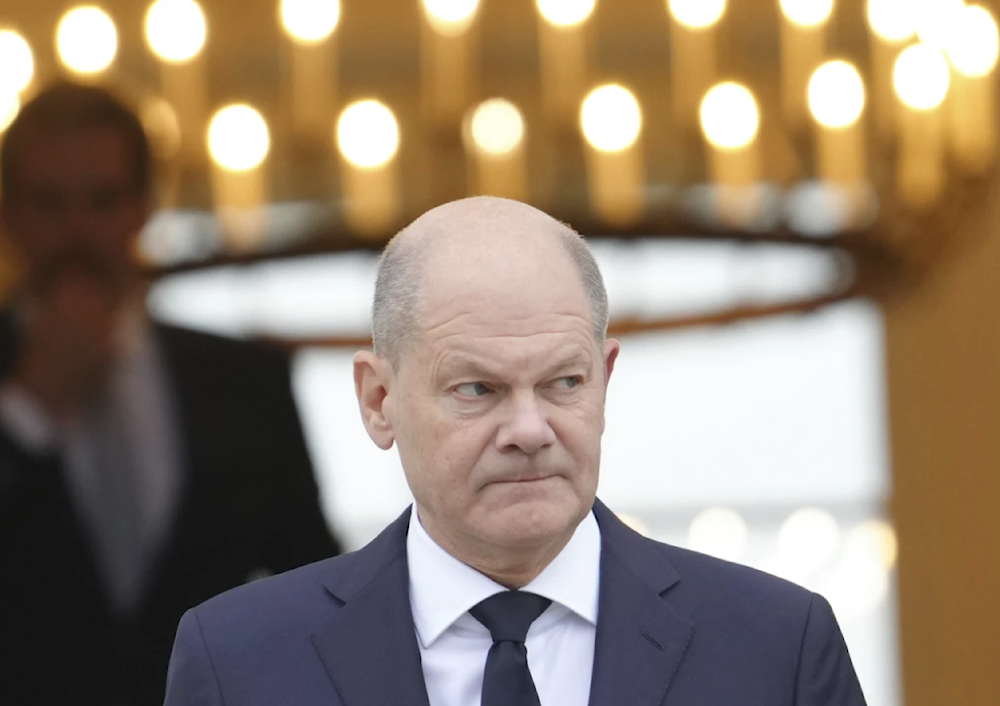Scholz rejects Baerbock plan to send troops to monitor Kiev ceasefire
According to the German Chancellor, the idea of sending German troops to Kiev is "out of the question."
-

German Chancellor Olaf Scholz leaves Bellevue Palace in Berlin on November 7, 2024. (AP)
German Chancellor Olaf Scholz has rejected his own foreign minister's suggestion that Germany monitor a possible ceasefire agreement between Moscow and Kiev in Ukraine.
Answering inquiries from MPs in the German parliament, Scholz stated that deploying the military to Ukraine was "out of the question" for him.
German Foreign Minister Annalena Baerbock had said at a NATO summit on Wednesday that she could envision international soldiers being sent to Ukraine to monitor a peace agreement.
When questioned if this could involve German soldiers, she stated that "the German side will support everything that serves peace in the future … with all its strength."
The discussion around European soldiers enforcing a ceasefire in Ukraine has intensified since Donald Trump's re-election as he explores a plan for a frozen 800-mile buffer zone between the Ukrainian and Russian forces.
Trump's envoy to Ukraine and Russia, retired Lieutenant General Keith Kellogg, co-authored a contentious peace proposal earlier this year with former CIA analyst Fred Fleitz entitled America First, which proposes halting US weapons deliveries to Ukraine if it refuses to enter peace talks, while escalating military support if Russia resists negotiations. The plan also suggests delaying or abandoning Ukraine's NATO membership as a bargaining chip to bring Moscow to the table.
Kaja Kallas, EU foreign policy leader, stated over the weekend that deploying European soldiers to Ukraine "could not be ruled out," and former PM of the UK Boris Johnson advocated last week for British and European soldiers to be sent to Ukraine in such a case.
UK, France seek European role in Ukraine ceasefire by troop deployment
Similarly, Britain and France were also reportedly in confidential talks, according to a report by Mirror on Tuesday, to explore the potential deployment of their troops to Ukraine as part of a ceasefire monitoring initiative. According to a senior NATO official cited in the report, these discussions are being held in London and Paris, "not at the NATO level."
One proposed scenario involves "an Anglo-French contingent patrolling the contact line between Ukraine and Russia in order to monitor a ceasefire that may be achieved as a result of peace talks."
The cited official noted that such preparations aim to ensure European involvement in mediation efforts that US President-elect Donald Trump could lead.
French Foreign Minister Jean-Noel Barrot stated that Paris is not ruling out troop deployment, while former UK Prime Minister Boris Johnson suggested that a multinational European force could help monitor the Russia-Ukraine border for an "end state" while rejecting the notion of troop deployment.
However, the report stressed, UK Foreign Secretary David Lammy reiterated Britain’s stance against deploying combat troops to the conflict zone, emphasizing continued support through training instead. "We are very clear that we stand ready and continue to support the Ukrainians with training particularly, but there has been a long-standing position that we are not committing UK troops to the theatre of action," Lammy said.

 3 Min Read
3 Min Read









